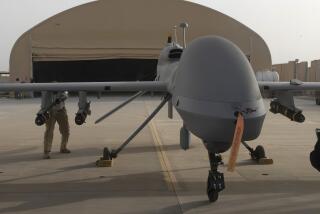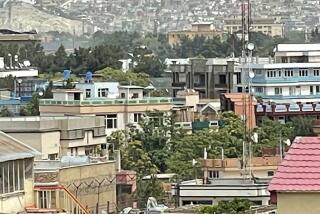In a Battle of Wits, Iraq’s Insurgency Mastermind Stays a Step Ahead of U.S.
- Share via
WASHINGTON — Despite the recent arrest of one of his would-be suicide bombers in Jordan and some top aides in Iraq, insurgency mastermind Abu Musab Zarqawi has eluded capture, U.S. authorities say, because his network has a much better intelligence-gathering operation than they do.
Zarqawi’s organization has been particularly successful because it has repeatedly targeted Iraqi civilians who tried to aid the American effort to capture him, frightening off other potential informants, U.S. officials said Tuesday.
“There is a huge network of intelligence operatives over there who are watching our every move. And they are watching every time we recruit an Iraqi to come back and inform to us about where he has been and what he has seen,” said one U.S. Justice Department counter-terrorism official, who is familiar with the campaign to track down Zarqawi. “And every time we have been able to do that, the person has ended up dead.”
Officials from several U.S. agencies said Washington had dramatically intensified its effort to catch Zarqawi over the last year as his network, which he calls Al Qaeda in Iraq, had launched a series of deadly and audacious attacks against civilian and military targets.
U.S. authorities say they have captured several of Zarqawi’s top aides and have nearly seized the 39-year-old Jordanian himself on at least three occasions. But Zarqawi, despite a $25-million U.S. bounty on his head, has outwitted his pursuers.
Along the way, he has gained worldwide notoriety, support and funding for his war against the United States and its allies and has begun to strike targets outside Iraq, as evidenced by last week’s deadly attacks on three hotels in Amman, Jordan, that killed 58 people.
U.S. officials from four agencies involved in the hunt for Zarqawi said their failure was not for lack of effort.
At least two top-secret, multi-agency commando teams have been assigned solely to track Zarqawi and mobilize quickly to pursue him into the most unstable areas of Iraq where he is believed to be hiding, several U.S. officials familiar with the units said. One of them is called Task Force 626, which was established last year by the Pentagon.
There are also dozens of special forces commandos and military intelligence gatherers looking for him. The CIA has deployed dozens of case officers and analysts, the FBI has flown in special agents and bomb experts, and forensic money-trackers from the Treasury Department are trying to monitor the flow of illicit funds into and out of Iraq as a way of cornering Zarqawi and his top aides, those officials said in interviews.
Eavesdropping satellites, unmanned drones and even U-2 spy planes are gathering intelligence on the insurgency, some of them specifically watching for Zarqawi, the officials confirmed.
U.S. forces are also trying to set up allied agencies within the fledgling Iraqi government. But many of the American officials complained that the Baghdad government had failed to establish a functioning intelligence agency. They said it had been unable to establish even an informal network of local informants who could help tighten the net around Zarqawi, as a joint U.S.-Iraqi intelligence effort did around former President Saddam Hussein and his inner circle of Baath Party members.
The Iraqis are trying, the U.S. officials stressed, noting that building such an intelligence capacity can take years and vast sums of money.
Making the task more difficult, many former Iraqi military and intelligence officials experienced in such matters are either actively supporting Zarqawi or refusing to get involved. And Zarqawi’s network is a harder target than Hussein’s deposed regime, in part because it is composed mostly of foreign fighters and Iraqi civilians, rather than former Baghdad government officials who were long known to U.S. authorities.
Zarqawi’s group was originally thought to comprise mainly non-Iraqis, but over the last year, he has been able to recruit many Iraqis as well as more foreigners after a string of successful attacks. He is believed to command perhaps 1,000 fighters and a much larger group of sympathizers.
U.S. authorities believe Zarqawi has become an even more prolific fundraiser than Al Qaeda leader Osama bin Laden. “Right now, Zarqawi is fighting the war, and [Bin Laden] is not,” said one senior U.S. intelligence official. “Who would you give money to?”
U.S. officials said they hoped to glean more about Zarqawi’s operations from Sajida Rishawi, a 35-year-old woman from the Iraqi insurgent stronghold of Ramadi who has confessed to trying to blow up one of the Amman hotels last week, along with her husband and two other Iraqi men.
Jordanian officials have said that Rishawi’s brother was a senior Zarqawi lieutenant who was killed in the Iraqi city of Fallouja, although it is unclear whether she had any direct contact with the insurgent leader.
Several U.S. officials said Rishawi was cooperating and providing details about how she and the three men were picked up by a driver, taken across the border and supplied with explosives. Rishawi’s explosives failed to detonate, and she fled and was arrested.
Even though Rishawi and some senior Zarqawi aides have been captured, the U.S. officials said his network had remained extremely disciplined and security-conscious. The militant leader has been able to disappear for long stretches at time, even immediately after nearly being captured.
“It’s not like John Gotti running around Manhattan in fancy suits and limousines,” the Justice Department counter-terrorism official said, referring to the late mob boss. “We are talking about a man who is operating in an area that is extremely primitive, in a very clandestine manner and with a huge network of people that do his communications for him and surround him and protect him.”
Some U.S. military commanders have spoken optimistically about a noose gradually tightening around Zarqawi in the wake of raids in the last year that have captured or killed a number of people identified as his top lieutenants.
“We truly believe that Zarqawi’s days are limited,” Army Maj. Gen. Rick Lynch, deputy chief of staff of the multinational force in Iraq, said Friday, pointing to a hexagon-shaped chart that showed tiers of what he said were senior Zarqawi operatives who had been killed or captured.
The chart identified seven “Tier 1” operatives, or those defined as having direct ties to Zarqawi, including Abu Azzam, described as the “emir of Iraq”; Abu Abdallah, a military leader in Ramadi; Abu Umer a-Kurdi, considered a master builder of homemade bombs in Baghdad; and leaders of Zarqawi’s organization in Mosul and Haditha and western Al Anbar province.
It also listed 38 “Tier 2” operatives killed or captured and 71 in “Tier 3,” many of them Iraqi and foreign fighters or leaders of cells, Lynch said.
“Given [the] many, many sources of intelligence and information, we have great success at killing or capturing his leaders, his cell leaders, his coordinators and his lieutenants, and this chart just continues to expand, and eventually, he’s going to be on this chart,” Lynch said.
U.S. operatives swarmed one restaurant where Zarqawi allegedly had been seen dining, and a hospital where he was believed to be seeking treatment, but came up empty-handed.
In February, Zarqawi jumped out of the back of a truck at a U.S. checkpoint near Ramadi before U.S. troops were able to search the vehicle, several American officials said. They said they captured his driver and bodyguard and recovered a large sum of cash and a laptop computer believed to belong to Zarqawi.
On several other occasions since then, officials say, the U.S. military has raided Zarqawi safe houses and found evidence that he had recently been there.
“Several times we have showed up at places where we know he was hours or days earlier. But the intelligence we get is never fresh enough,” said the senior U.S. intelligence official.
That has allowed Zarqawi to move in and out of Iraq with relative impunity, say U.S. officials who cite intelligence reports that he has traveled to Jordan, Syria and Iran to bolster his ranks and raise money.
Electronic surveillance has made it increasingly difficult for Zarqawi to communicate with his network of supporters, and U.S. authorities say last year’s military offensive in Fallouja took away his main base of operations.
But U.S. officials said they were losing the battle to establish desperately needed on-the-ground intelligence, in part because of Zarqawi’s campaign of violence targeting those working against him.
“There’s no upside for helping the Americans,” one U.S. counter-terrorism official said. “Even if you were willing to make a personal sacrifice” to help the U.S. effort, “they’ll go after your family. Actionable intelligence is a challenge in any country, but particularly so in Iraq.”
*
Times staff writer John Daniszewski in Baghdad contributed to this report.
More to Read
Sign up for Essential California
The most important California stories and recommendations in your inbox every morning.
You may occasionally receive promotional content from the Los Angeles Times.










